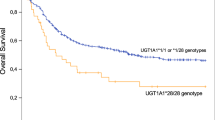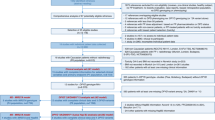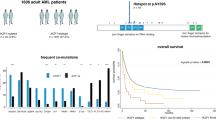Abstract
The polymorphism rs16754 of the WT1 gene has been described as a possible prognostic marker in different acute myeloid leukemia (AML) cohorts; however, it is not supported by all the studies. We performed the first meta-analysis evaluating the effect of this polymorphism upon the effectiveness of standard AML therapy. Fourteen cohort studies were included (3618 patients). Patients with the variant allele showed a significant higher overall survival (OS) at 5 years (OR:1.24, 95% CI: 1.06–1.45, P=0.007, with dominant model). WT1 did not influence complete remission, but a higher disease-free survival was observed with the variant allele. In the subgroup analysis, Caucasians, pediatric and patients treated with idarubicin and etoposide carrying the variant allele showed consistent results in OS, whereas patients with cytogenetically normal AML did not show differences. To verify the effect of this polymorphism upon other outcomes, studies in larger and multiracial populations are needed.
This is a preview of subscription content, access via your institution
Access options
Subscribe to this journal
Receive 6 print issues and online access
$259.00 per year
only $43.17 per issue
Buy this article
- Purchase on Springer Link
- Instant access to full article PDF
Prices may be subject to local taxes which are calculated during checkout





Similar content being viewed by others
References
Bloomfield CD, Lawrence D, Byrd JC, Carroll A, Pettenati MJ, Tantravahi R et al. Frequency of prolonged remission duration after high-dose cytarabine intensification in acute myeloid leukemia varies by cytogenetic subtype. Cancer Res 1998; 58: 4173–4179.
Slovak ML, Kopecky KJ, Cassileth PA, Harrington DH, Theil KS, Mohamed A et al. Karyotypic analysis predicts outcome of preremission and postremission therapy in adult acute myeloid leukemia: A Southwest Oncology Group/ Eastern Cooperative Oncology Group Study. Blood 2000; 96: 4075–4083.
Rombouts WJ, Blokland I, Lowenberg B, Ploemacher RE . Biological characteristics and prognosis of adult acute myeloid leukemia with internal tandem duplications in the Flt3 gene. Leukemia 2000; 14: 675–683.
Schnittger S, Schoch C, Kern W, Mecucci C, Tschulik C, Martelli MF et al. Nucleophosmin gene mutations are predictors of favorable prognosis in acute myelogenous leukemia with a normal karyotype. Blood 2005; 106: 3733–3739.
Preudhomme C, Sagot C, Boissel N, Cayuela JM, Tigaud I, de Botton S et al. Favorable prognostic significance of CEBPA mutations in patients with de novo acute myeloid leukemia: A study from the Acute Leukemia French Association (ALFA). Blood 2002; 100: 2717–2723.
Whitman SP, Liu S, Vukosavljevic T, Rush LJ, Yu L, Liu C et al. The MLL partial tandem duplication: Evidence for recessive gain-of-function in acute myeloid leukemia identifies a novel patient subgroup for molecular targeted therapy. Blood 2005; 106: 345–352.
Vardiman JW, Thiele J, Arber DA, Brunning RD, Borowitz MJ, Porwit A et al. The 2008 revision of the World Health Organization (WHO) classification of myeloid neoplasms and acute leukemia: rationale and important changes. Blood 2009; 114: 937–951.
King-Underwood L, Renshaw J, Pritchard-Jones K . Mutations in the Wilms’ tumor gene WT1 in leukemias. Blood 1996; 87: 2171–2179.
Summers K, Stevens J, Kakkas I, Smith M, Smith LL, Macdougall F et al. Wilms’ tumour 1 mutations are associated with FLT3-ITD and failure of standard induction chemotherapy in patients with normal karyotype AML. Leukemia 2007; 21: 550–551.
Paschka P, Marcucci G, Ruppert AS, Whitman SP, Mrózek K, Maharry K et al. Wilms’ tumor 1 gene mutations independently predict poor outcome in adults with cytogenetically normal acute myeloid leukemia: a Cancer and Leukemia Group B study. J Clin Oncol 2008; 26: 4595–4602.
Virappane P, Gale RA, Hills R, Kakkas I, Summers K, Stevens J et al. Mutations of the Wilms’ tumor 1 gene is a poor prognostic factor associated with chemoresistance in normal karyotype acute myeloid leukemia: the United Kingdom Medical Research Council Adult Leukaemia Working Party. J Clin Oncol 2008; 26: 5429–5435.
Renneville A, Boissel N, Zurawski V, Llopis L, Biggio V, Nibourel O et al. Wilms tumor 1 gene mutations are associated with a higher risk of recurrence in young adults with acute myeloid leukemia: a study from the Acute Leukemia French Association. Cancer 2009; 115: 3719–3727.
Hollink IH, van den Heuvel-Eibrink MM, Zimmermann M, Balgobind BV, Arentsen-Peters ST, Alders M et al. Clinical relevance of Wilms tumor 1 gene mutations in childhood acute myeloid leukemia. Blood 2009; 113: 5951–5960.
Becker H, Marcucci G, Maharry K, Radmacher MD, Mrózek K, Margeson D et al. Mutations of the Wilms tumor 1 geneWT1 in older patients with primary cytogenetically normal acute myeloid leukemia: a Cancer and Leukemia Group B study. Blood 2010; 116: 788–792.
Hou H-A, Huang T-C, Lin L-I, Liu C-Y, Chen C-Y, Chou W-C et al. WT1 mutation in 470 adult patients with acute myeloid leukemia: stability during disease evolution and implication of its incorporation into a survival scoring system. Blood 2010; 115: 5222–5231.
Gaidzik VI, Schlenk RF, Moschny S, Becker A, Bullinger L, Corbacioglu A et al. Prognostic impact of WT1 mutations in cytogenetically normal acute myeloid leukemia: a study of the German-Austrian AML Study Group. Blood 2009; 113: 4505–4511.
Damm F, Heuser M, Morgan M, Yun H, Grosshennig A, Göhring G et al. Single nucleotide polymorphism in the mutational hotspot of WT1 predicts a favorable outcome in patients with cytogenetically normal acute myeloid leukemia. J Clin Oncol 2010; 28: 578–585.
Ho PA, Zeng R, Alonzo TA, Gerbing RB, Miller KL, Pollard JA et al. Prevalence and prognostic implications of WT1 mutations in pediatric acute myeloid leukemia: A report from the Children’s Oncology Group. Blood 2010; 116: 702–710.
Call KM, Glaser T, Ito CY, Buckler AJ, Pelletier J, Haber DA et al. Isolation and characterization of a zinc finger polypeptide gene at the human chromosome 11 Wilms tumor locus. Cell 1990; 60: 509–520.
Yang L, Han Y, Saurez Saiz F, Minden MD . A tumor suppressor and oncogene: the WT1 story. Leukemia 2007; 21: 868–876.
Ariyaratana S, Loeb DM . The role of the Wilms tumour geneWT1 in normal and malignant haematopoiesis. Expert Rev Mol Med 2007; 9: 1–17.
Altshuler DM, Gibbs RA, Peltonen L, Altshuler DM, Gibbs RA, Peltonen L et al. Integrating common and rare genetic variation in diverse human populations. Nature 2010; 467: 52–58.
Komar AA . Silent SNPs: impact on gene function and phenotype. Pharmacogenomics 2007; 8: 1075–1080.
Ma W, Kantarjian H, Zhang X, Wang X, Zhang Z, Yeh C-H et al. Mutation and single- nucleotide polymorphism (rs16754) in Wilms tumor-1 gene are independent prognostic factors in acute myeloid leukemia. Blood 2009; 114: 413.
Damm F, Heuser M, Ganser A, Krauter J . Reply to I.H.I.M Hollink et al. J Clin Oncol 2010; 28: e527–e528.
Renneville A, Boissel N, Helevaut N, Nibourel O, Terré C, Pautas C et al. Prognostic impact of Wilms tumor 1 single nucleotide polymorphism rs16754 in older patients with acute myeloid leukemia. Blood 2010; 161: 1113.
Ho PA, Kuhn J, Gerbing RB, Pollard JA, Zeng R, Miller KL et al. WT1 synonymous single nucleotide polymorphism rs16754 correlates with higher mRNA expression and predicts significantly improved outcome in favorable-risk pediatric acute myeloid leukemia: a report from the children's oncology group. J Clin Oncol 2011; 29: 704–711.
Ho PA, Alonzo TA, Gerbing RB, Sung L, Aplenc R, Pollard JA et al. WT1 snp rs16754 Genotype Predicts Treatment Related Mortality (TRM) in African-American and Asian Pediatric AML Patients: A Report From the Children's Oncology Group. Blood 2012; 120: 1385.
Abalkhail H, El-Solh H, Alseraihy A, Ayas M, Al-Ahmari A, Belgaumi AF et al. The AG Genotype of the Wilms Tumor-1 rs16754 SNP is associated with poor outcome in pediatric AML patients treated with stem cell transplantation but not in adults. Blood 2011; 118: 5327.
Luo S, Yu K, Yan QX, Shen ZJ, Wu JB, Chen HM et al. Analysis of WT1 mutations, expression levels and single nucleotide polymorphism rs16754 in de novo non-M3 acute myeloid leukemia. Leuk Lymphoma 2014; 55: 349–357.
Chen X, Yang Y, Huang Y, Tan J, Chen Y, Yang J et al. WT1 mutations and single nucleotide polymorphism rs16754 analysis of patients with pediatric acute myeloid leukemia in a Chinese population. Leuk Lymphoma 2012; 53: 2195–2204.
Hollink IH, van den Heuvel-Eibrink MM, Zimmermann M, Balgobind BV, Arentsen-Peters ST, Alders M et al. No prognostic impact of the WT1 gene single nucleotide polymorphism rs16754 in pediatric acute myeloid leukemia. J Clin Oncol 2010; 28: e523–e526.
Renneville A, Boissel N, Helevaut N, Nibourel O, Terré C, Pautas C et al. Wilms' tumor 1 single-nucleotide polymorphism rs16754 does not predict clinical outcome in adult acute myeloid leukemia. Leukemia 2011; 25: 1918–1921.
Luna I, Such E, Cervera J, Barragán E, Jiménez-Velasco A, Dolz S et al. Analysis of SNP rs16754 of WT1 gene in a series of de novo acute myeloid leukemia patients. Ann Hematol 2012; 91: 1845–1853.
Becker H, Maharry K, Radmacher MD, Mrózek K, Metzeler KH, Whitman SP et al. Clinical outcome and gene- and microRNA-expression profiling according to the Wilms tumor 1WT1 single nucleotide polymorphism rs16754 in adult de novo cytogenetically normal acute myeloid leukemia: a Cancer and Leukemia Group B study. Haematologica 2011; 96: 1488–1495.
Choi Y, Lee JH, Hur EH, Kang MJ, Kim SD, Lee JH et al. Single nucleotide polymorphism of Wilms' tumor 1 gene rs16754 in Korean patients with cytogenetically normal acute myeloid leukemia. Ann Hematol 2012; 91: 671–677.
Zhang DY, Yan H, Cao S, Zhang W, Li XL, Zeng H et al. Wilms Tumor 1 rs16754 predicts favorable clinical outcomes for acute myeloid leukemia patients in South Chinese population. Leuk Res 2015; 39: 568–574.
Liberati A, Altman DG, Tetzlaff J, Mulrow C, Gotzsche PC, Ioannidis JP et al. The PRISMA statement for reporting systematic reviews and meta-analyses of studies that evaluate healthcare interventions: explanation and elaboration. BMJ 2009; 339: b2700.
Komar AA, Lesnick T, Reiss C . Synonymous codon substitutions affect ribosome traffic and protein folding during in vitro translation. FEBS Lett 1999; 462: 387–391.
Qi XW, Zheng XD, Zong BG, Chen QQ, Zhang F, Yang XH et al. Association between WT1 polymorphisms and susceptibility to breast cancer: results from a case-control study in a southwestern Chinese population. Am J Cancer Res 2015; 5: 1234–1250.
Kim DH, Xu W, Ma C, Liu X, Siminovitch K, Messner HA et al. Genetic variants in the candidate genes of the apoptosis pathway and susceptibility to chronic myeloid leukemia. Blood 2009; 113: 2517–2525.
Carmichael SL, Ma C, Choudhry S, Lammer EJ, Witte JS, Shaw GM . Hypospadias and genes related to genital tubercle and early urethral development. J Urol 2013; 190: 1884–1892.
Kimchi-Sarfaty C, Oh JM, Kim IW, Sauna ZE, Calcagno AM, Ambudkar SV et al. A "silent" polymorphism in the MDR1 gene changes substrate specificity. Science 2007; 315: 525–528.
Acknowledgements
This study was supported by grants from the ‘Instituto Carlos III’ (PIE13/00046) and the ‘Instituto Investigación Sanitaria La Fe’ (2013/0331) granted to Pharmacy and Hematology Departments and the Pharmacogenetics Unit of the ‘Instituto Investigación Sanitaria La Fe’ and the ‘Área del Medicamento’ of the ‘Hospital Universitari i Politècnic La Fe’, Valencia, Spain. We are grateful to Adrian Keukens for his editorial assistance on this manuscript.
Author information
Authors and Affiliations
Corresponding authors
Ethics declarations
Competing interests
The authors declare no conflict of interest.
Rights and permissions
About this article
Cite this article
Megías-Vericat, J., Herrero, M., Rojas, L. et al. A systematic review and meta-analysis of the impact of WT1 polymorphism rs16754 in the effectiveness of standard chemotherapy in patients with acute myeloid leukemia. Pharmacogenomics J 16, 30–40 (2016). https://doi.org/10.1038/tpj.2015.80
Received:
Revised:
Accepted:
Published:
Issue Date:
DOI: https://doi.org/10.1038/tpj.2015.80
This article is cited by
-
The prognostic impact of Wilms tumor-1 polymorphism (rs16754) and human myeloid inhibitory C-type lectin-like receptor expression in cytogenetically normal-acute myeloid leukemia
Egyptian Journal of Medical Human Genetics (2021)



